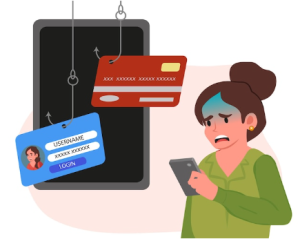Last updated on January 21, 2025

Since almost everything is digital today, protecting your personal information is more important than ever. Hackers are always finding new ways to steal sensitive data or compromise your devices for their own gain. With that in mind, here are some easy and effective ways to stay safe online:
- Use Strong Passwords with Password Managers
- Don’t use simple passwords like “123456”, your name, your friend’s name, or your pet’s name.
- Instead, create a password with a mix of uppercase letters, numbers, and symbols.
Example: MyP@ssw0rdIn2024!
More on Password tips - Use a reliable password manager that helps you securely store and manage your passwords, so you don’t have to remember every complex password.
- Turn on Two-Factor Authentication (2FA)
- Two-Factor Authentication (2FA) adds extra security to your accounts.
- Even if someone guesses your password, they’ll need a second code (sent to your phone or app) to access your account.
- Be Careful with Emails and Links
- Avoid clicking on links or downloading files from unknown / suspicious emails.
- Hackers often send fake emails to trick you into revealing your information (This is called phishing).
- Update Your Software Regularly
- Always keep your devices (phone, computer, etc.) and software updated. Updates fix security vulnerabilities that hackers might try to exploit.
- Avoid Public Wi-Fi for Important Tasks
- Don’t use public Wi-Fi to log into your bank account, email, or other important services as hackers can easily steal your data.
- Install Antivirus Software
- Antivirus software helps protect your device by scanning files, downloads, and apps for threats.
- It also blocks dangerous websites and warns you about suspicious activity.
- Without antivirus software, your device is vulnerable to malware that can steal your data or damage your system.
- Think Before You Share Personal Information
- Never share sensitive information like passwords, ID numbers, or other private details online.
- Hackers can use this information to impersonate you and cause harm.
- Check Website Reliability
- Before visiting a website, verify the URL and ensure that it is safe.
- Look for “https://” in the URL and a padlock symbol next to the web address, indicating the website uses encryption to protect your data.
- Avoid websites with misspelled or suspicious domain names, as they may be fake or dangerous.
References:
https://www.cisa.gov/news-events/news/4-things-you-can-do-keep-yourself-cyber-safe
https://www.vu.edu.au/about-vu/news-events/study-space/10-easy-ways-to-protect-yourself-from-cyber-attacks

